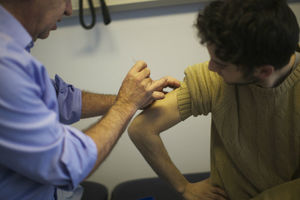
Credit UKHSA
#17,012
Although it has been often stated by public health officials (and the vaccine manufacturers), it bears repeating; we really don't know how effective the JYNNEOS(TM) vaccine approved in 2019 (and the older ACAM2000 smallpox vaccine) will be against the strain of Monkeypox currently spreading globally.
This from the CDC website:
Vaccine Effectiveness
Because Monkeypox virus is closely related to the virus that causes smallpox, the smallpox vaccine can protect people from getting monkeypox. Past data from Africa suggests that the smallpox vaccine is at least 85% effective in preventing monkeypox. The effectiveness of JYNNEOS(TM) against monkeypox was concluded from a clinical study on the immunogenicity of JYNNEOS and efficacy data from animal studies.
Smallpox and monkeypox vaccines are effective at protecting people against monkeypox when given before exposure to monkeypox. Experts also believe that vaccination after a monkeypox exposure may help prevent the disease or make it less severe.
While the data suggests these vaccines should be largely effective against Monkeypox, that doesn't mean 100% protection. For many, it may prevent infection, while for others it may simply reduce the severity of infection.
We also don't know how long this protection will last (presumably for years, though).
As the following EID report illustrates, even the older ACAM2000 vaccine has limitations. I'v only posted some highlights, follow the link to read the full report.
Research Letter
Monkeypox in Patient Immunized with ACAM2000 Smallpox Vaccine During 2022 Outbreak
Matthew Turner, Jeremy Mandia1, Case Keltner1, Robert Haynes1, Paul Faestel, and Luke Mease
Author affiliation: Madigan Army Medical Center, Tacoma, Washington, USA
Abstract
We report a case of monkeypox in the United States in a patient who had been vaccinated with ACAM2000 smallpox vaccine 8 years earlier. Despite his vaccination status, he still contracted disease. He showed prodromal symptoms preceding development of painless penile lesions that later coalesced.
In the summer of 2022, the Centers for Disease Control and Prevention initiated an emergency response because of a national outbreak of infection with monkeypox virus. On June 28, 2022, the US Department of Health and Human Services announced a national monkeypox vaccination strategy to contain the pandemic (1).
We report a patient in Washington, USA, who contracted monkeypox despite being successfully immunized against smallpox with the ACAM2000 smallpox vaccine (https://www.sanofi.comExternal Link) 8 years earlier. We pose major questions regarding the efficacy of ACAM2000 vaccine amidst ongoing shortages of the JYNNEOS (https://www.bavarian-nordic.comExternal Link) 2-dose monkeypox vaccine.
The patient was a previously healthy 34-year-old man who had sex with men came to a walk-in sexually transmitted infections clinic because of a 4-day history of malaise, fatigue, and headache and a 2-day history of 4 painless penile lesions. The patient had sought evaluation at a local emergency department 2 days before he visited the clinic. Results for testing performed in the emergency department were negative for Neisseria gonorrhea, Chlamydia trachomatis, and herpes simplex virus. His constitutional symptoms improved over the next 2 days. However, his penile ulcers progressed into white papular lesions, prompting him to seek reevaluation.
(SNIP)
Since the discontinuation of the global smallpox vaccination campaign after eradication of the disease in 1980, monkeypox is the primary circulating orthopoxvirus of public health concern. The ACAM2000 live vaccinia virus vaccine that this patient received in 2014 has been shown to provide protection against monkeypox (2,3). Earlier studies have reported that among persons vaccinated, monkeypox cases tend to be mild in number of lesions and prodromal symptoms (4–6). A study in 1988 reported that smallpox vaccination offered ≈85% protection against monkeypox (4,7). A study in 2008 reported that ACAM2000 vaccine fully protected cynomolgus monkeys after a lethal dose of monkeypox virus; 1 vaccinated animal had a minor rash at the site of inoculation (8), which is largely consistent with the manifestations and clinical course of this patient.
Although the mild manifestations in this patient might be attributable to his vaccination against smallpox, it did not prevent infection. The JYNNEOS vaccine is a nonreplicating vaccine product that has a Food and Drug Administration indication to protect against smallpox and monkeypox (9). However, the JYNNEOS and ACAM2000 vaccines present disparate challenges. Specifically, the JYNNEOS vaccine is administered as a 2-dose regimen that shows a mild side effect profile, and the ACAM2000 vaccine is a single inoculation that can induce severe adverse effects. However, because of persistent JYNNEOS shortages hampering preexposure and postexposure prophylaxis efforts, vaccination with ACAM2000 might be an option in locales that urgently need immunizations protective against monkeypox. The efficacy of either vaccine in the current outbreak remains unknown.
Although vaccination is foundational for prevention of infectious disease, this case highlights that vaccination alone does not guarantee immunity from monkeypox. Public health leaders should taper expectations that vaccination alone will end the outbreak. Vaccine should complement, not replace, public health campaigns that aim to minimize high-risk health behaviors.
Dr. Turner is a transitional year intern physician at Madigan Army Medical Center in Tacoma, WA. His research interests include thyroid pathology and long-term neurologic sequela of spaceflight.
Further complicating matters, shortages of the JYNNEOS vaccine has prompted the United States, the UK, and other countries to adopt a dose-sparing strategy - based on the results of a single 2015 study - which showed that 2 fractional doses (1/5th) of JYNNEOS given intradermally, 28 days apart, provided similar protection as that seen from the original intramuscular route.
Whether, or how much, this change will impact the effectiveness of the JYNNEOS vaccine remains to be seen.
None of this is to diminish the value of either vaccine for high risk groups, but neither should be viewed as an impenetrable and/or permanent shield against the current Monkeypox virus, or any future strains that may emerge.
Last week's warning from the FDA On The Potential For Monkeypox To Evade TPOXX (tecovirimat) Antivirals further illustrates that we can't rely on pharmacological solutions alone to end this epidemic.
It is never that easy.
